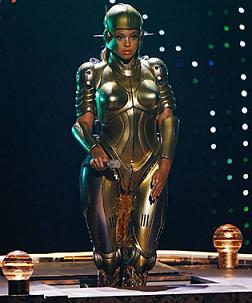"One day in Berlin ... Eno came running in and said, 'I have heard the sound of the future.' ... he puts on 'I Feel Love', by Donna Summer ... He said, 'This is it, look no further. This single is going to change the sound of club music for the next fifteen years.' Which was more or less right."
-David Bowie, Sound+Vision
Donna Summer died yesterday after an undisclosed battle with cancer. With her, I feel a little of my childhood is now gone. My earliest recollection of Summer's work was probably when I was nine or ten, visiting with my brother the house of one of his friends. His friend had Summer's early Best Of, 'On the Radio' and was playing it, while his Dad, the local police sergeant, came into their lounge and dismissed the singer as "a moaning cow". We thought it was pretty funny, but the song stuck with me; hearing it frequently later on, of course, the radio, it's still one of the earliest Donna Summer singles I can easily recall. The big song of Summer's earlier career though was probably always on the radio, just not one I'd associated wth her at the time - 'I Feel Love'.
'I Feel Love' owes much to Summer's voice, but for me it's the arrangement of Giorgio Moroder that sells the track; an escalating of upper register vocals gradually climbing the scales through each verse until, finally, releasing, Summer returning to a middle range and delivering the song title in a simple repeated line for the chorus. It's a killer, and it's no surprise to me that the song's been sampled and adopted by so many over the years. The chorus is what reveals Summer's presence more, almost a snarl of a delivery compared to the seemingly modulated vocals building previously. I doubt there's any more electronic trickery there than the usual production, but the way her vocals sustain the single-note "ooooh" with every line while a flanged synthesiser wash follows further down the scale (the closest you're going to get to a bass line in this song) and Moroder's looped rhythm track repeats its own climb up the scale, turns the vocal into another synthetic trick. It's such a succesful matching that Summer's voice is less recognisable for it; for some time I though it was Debbie Harry, another of Moroder's later collaborators.
The looped rhythm is hypnotic, perfect for the dance floor and the sound of Disco, a rare movement in music for its futurism. The late Seventies saw a natural convergence of the highly-synthesised Disco sound with the ascent of popular Sci-Fi on the big and small screen, and so the likes of Moroder, Meco (who memorably Disco-fied the themes to the first two Star Wars movies), and the incorporated SF elements in the look and music of artists like Eruption, La Belle, Boney M and Earth Wind and Fire are for me intrinsically linked to the experience of watching Star Wars, Battlestar Galactica (whose chrome Cylons are the epitome of Disco-tech) and Logan's Run at the movies. Given the association it's little surprise that Beyonce would later reference the style for her own stage attire. And with her, of course, the likes of Kylie Minogue and Lady Gaga. Disco for me is the soundtrack of Seventies Sci Fi, and I haven't even mentioned the likes of Geoff Love and Jeff Wayne. Need I?
So farewell, Ms Summer. A voice destined to be with us for ages to come.
So farewell, Ms Summer. A voice destined to be with us for ages to come.

No comments:
Post a Comment